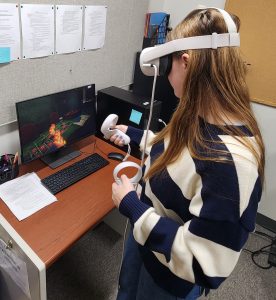An ongoing UConn study reveals that virtual reality may reduce addictive behaviors

A UConn study suggests that virtual reality intervention may reduce problematic addictions, such as gambling. Contributed photo.
Problem gambling among college students is on the rise, and occurring at a rate two to four times higher than adults. Thanks to the internet, Access to gambling has never been easier And the opportunities to gamble - from online poker and sports betting to virtual casinos - have never been more plentiful.
UConn associate professor of psychological sciences Robert Astur is leading an innovative project that takes aim at the problem by offering students a way to curb their urge to gamble using virtual reality (VR). Students participating in the two-week program, which began in January 2024, are instructed to seek out and destroy gambling related triggers in a VR casino.
Data analysis will be completed this summer, but preliminary analyses indicate that after completing the VR intervention, participants show a reduction in gambling urges and a dramatic increase in their ability to avoid risky gambling behaviors. Once the full dataset is analyzed, it will hopefully show that "crushing" these stimuli in a virtual setting may weaken the student's compulsion to gamble in the real world, Astur says.
The success of a 2009 VR smoking cessation study to which Astur contributed suggests the approach could work with gambling. In that study, led by University of Quebec Psychology Professor Benoit Gerard, participants searched for and crushed cigarettes in a VR setting. Researchers found that individuals in the cigarette-crushing group displayed significant reductions in nicotine dependence and a significantly better abstinence rate (15% versus 2%). They also dropped out of treatment at a lower rate than those in the control group.
Gambling intervention uses similar parameters to those of the smoking study, along with follow up assessments to quantify the extent to which the intervention reduces the student's gambling cravings and real world gambling activities.
"We'll track physiological responses and behavioral changes to see if this intervention helps cut down gambling habits," says Astur. "If successful, this approach could revolutionize addiction treatment, not just for gambling, but for other compulsive behaviors like cannabis use, gaming, and even cell phone addiction. The future of addiction therapy might just be virtual."

Astur's team built their virtual casino using an open-source program that they customized with add-on components. During a recent visit to the lab, senior psychology major, Allison Millspaugh, demonstrated how the intervention works. Wearing a VR headset, Millspaugh "entered" the casino and used the hand held controllers as a hammer to smash slot machines, and set fire to cards on a blackjack table.
Individuals between the ages of 18 and 24 are particularly vulnerable to addictive behaviors because the frontal lobe of the adolescent brain is not fully developed, says Finn Zakas, a doctoral student in behavioral neuroscience on the team. Participants in the UConn study were recruited through UConn's Student Digest, and assessed with follow-up emails to determine their level of problem gambling, the frequency of their cravings and preferred form of gambling, be it scratch tickets to online sports betting or in-person betting at a one of the two casinos in Connecticut. Students are paid a small stipend for taking part and have to want to reduce their problem gambling.
"Self-efficacy is such a critical component of controlling your behavior in life," says Astur.
"What we're really looking for is changes in gambling behavior," adds Zakas. "Urges and feelings they can control in the face of gambling stimuli."
The stakes are high, says Astur. In addition to the financial impact, problem gamblers are at increased risk for depression and suicide as well as developing additional addictions. The problem is also linked to anxiety, poor academic performance, increased criminal activity, and disruptions in friendships and family relationships.
"There are these addictions that people think of as less severe, but when it's impacting their grades and relationships, and leads to depression and suicide, that impacts society," says Astur.
If the research team sees a statistically significant reduction in gambling behavior, Astur plans to apply for additional grant funding to expand the study beyond the roughly 30 students in the pilot. He expects to publish the findings in late 2025, he says.
"I think that there are behavioral interventions that might be appealing to students, that might just help them stem their gambling," Astur says. "This is a way of providing hope for reducing problem behaviors, one that might be more accessible to students and less stigmatizing than other programs, like a twelve-step programs."






